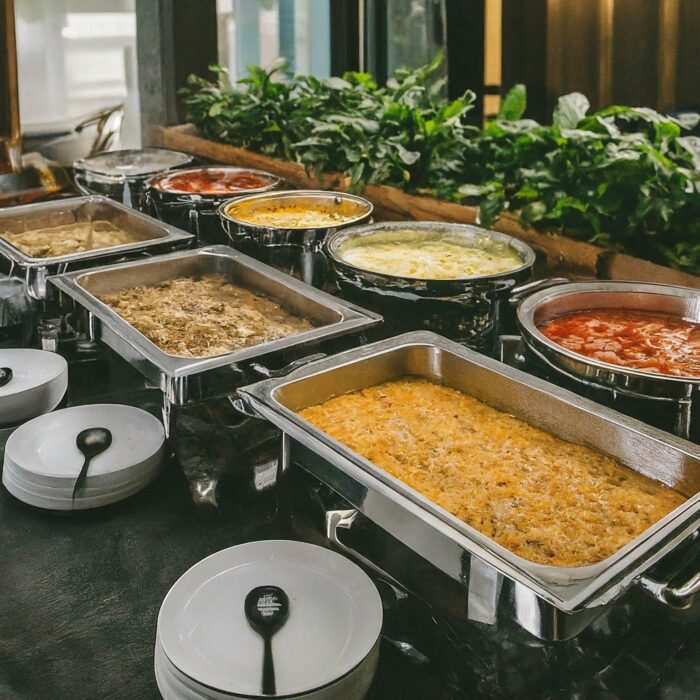
A baine marie set-up with dishes on it.
The catering industry, an indispensable part of the events and hospitality sector, is thriving. From weddings to corporate events, successful catering businesses have become synonymous with memorable culinary experiences.
This article shines a spotlight on what makes a catering business successful, highlighting key factors that contribute to its notoriety and acclaim.
Understanding the Core Components
To fully grasp the essence of a successful catering business, it is pivotal to understand the core components that form its foundation. Quality of food, excellent service, and the ability to cater to various dietary needs and preferences are at the forefront.
Quality of Food
The cornerstone of any catering business is the quality of food offered. Fresh, flavorful, and innovative dishes not only captivate the guests but also leave a lasting impression.
Successful caterers are meticulous about ingredient selection, sourcing from trusted suppliers, and ensuring that dishes are beautifully presented.
Excellent Service
Equally important is the level of service provided. Professionalism, punctuality, and the ability to handle unexpected challenges are attributes that define stellar service.
A seamless dining experience is achieved when caterers are attentive, courteous, and adept at accommodating client requests.
Catering to Various Dietary Needs
With the rising awareness and prevalence of dietary restrictions and preferences, successful catering businesses are those that can adapt.
Offering a diverse menu that includes options for vegetarians, vegans, and those with allergies is not just a trend but a necessity. Customization and flexibility go a long way in ensuring client satisfaction.
Strategic Business Practices
Beyond the fundamental components, operational and strategic practices play a crucial role in the success of catering businesses. These practices include detailed planning, marketing strategies, and maintaining a strong financial foundation.
Detailed Planning and Organization
Effective planning is the backbone of any successful catering operation. This involves thorough event preparation, precise scheduling, and the ability to foresee and mitigate potential issues.
Attention to detail and organizational skills are essential, ensuring that everything from preparation to service is executed flawlessly.

Baine marine with food in it.
Marketing and Brand Building
In today’s competitive market, strategic marketing and brand building are crucial. Successful catering businesses invest in creating a strong brand identity through professional websites, social media presence, and client testimonials.
Word-of-mouth remains a powerful tool, and maintaining an impeccable reputation helps in attracting and retaining clients.
Financial Management
A strong financial foundation is vital for sustainability and growth. Successful caterers keep a close eye on costs, manage budgets wisely, and ensure proper pricing strategies to maintain profitability. Regular financial audits and adjustments are necessary to stay competitive and economically viable.
Embracing Innovation
Innovation serves as a differentiating factor in the catering industry. Forward-thinking catering businesses embrace new technologies, culinary trends, and sustainable practices to stay ahead of the curve.
Technology Integration
The integration of technology has revolutionized catering operations. Adoption of software for event planning, customer relationship management (CRM), and inventory management streamlines processes and enhances efficiency.
Moreover, digital platforms enable easier client interactions, bookings, and feedback collection.
Culinary Innovations
Keeping up with culinary trends and innovations sets successful caterers apart. This may include experimenting with global cuisines, fusion dishes, or introducing novel presentation techniques.
Continuous learning and adapting to new culinary advancements are crucial for captivating the ever-evolving palate of clients.
Sustainable Practices
Sustainability has gained immense importance and catering businesses are no exception. Practices such as minimizing food waste, using eco-friendly packaging, and sourcing locally grown produce are becoming standard among successful caterers.
Clients appreciate and support businesses that prioritize environmental responsibility.
Client Relations and Networking
Building and maintaining strong client relations and networks are integral aspects that successful catering businesses prioritize.
Building Client Relationships
Exceptional client service goes beyond the event day. Follow-up communications, thank you notes, and offering personalized experiences help in fostering long-term relationships.
Understanding and anticipating client needs, and consistently exceeding expectations builds loyalty and generates repeat business.
Networking and Referrals
Active participation in industry events, collaborations with event planners, and networking within professional circles enhance visibility and credibility.
Being part of industry associations and attending trade shows provide opportunities to connect with potential clients and partners, expanding the business’s reach.
Employee Development and Retention
Behind every successful catering business is a dedicated team. Focusing on employee development and retention is crucial for maintaining service quality and consistency.
Training and Development
Regular training programs for staff in areas such as culinary skills, customer service, and safety protocols ensure that employees are well-equipped to deliver top-notch service.
Encouraging professional development and providing opportunities for growth within the organization contribute to a motivated and skilled workforce.
Retention Strategies
High employee turnover can be detrimental to service quality. Successful caterers implement retention strategies such as offering competitive wages, fostering a positive work culture, and recognizing and rewarding employee contributions.
A satisfied and stable team is instrumental in driving the business’s success.
Conclusion
Combining culinary excellence, superior service, strategic business practices, innovation, strong client relations, and dedicated employees creates a recipe for success in the catering industry.
By continuously evolving and adapting to the changing demands and preferences of clients, successful catering businesses set themselves apart, providing unforgettable dining experiences and solidifying their place in the competitive landscape.

